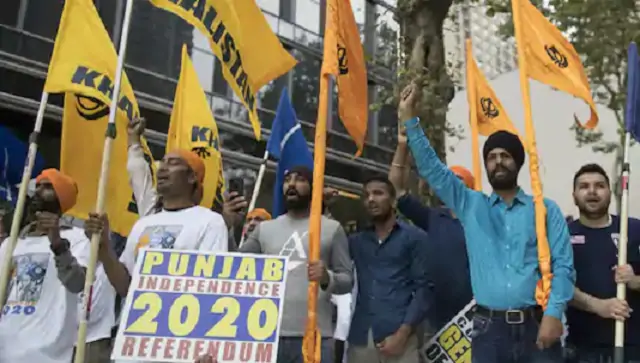
SOURCE: FIRST POST
“Canada knows what’s going on,” says veteran journalist Terry Milewski of the pockets of support for Sikh separatism within its borders, “And will not endanger relations with India, except by accident — as when a convicted Khalistani terrorist (Jaspal Atwal) was invited to dine with the Trudeaus during their 2018 visit to New Delhi.” Calling the incident a ‘grave embarrassment’, he adds, “But it was stupidity, not a policy to antagonise India.”
Milewski, whose paper titled ‘Khalistan: A Project of Pakistan’ was released last week, therein argues that despite the efforts of Sikh separatists in the West to drum up support for an independent State of Khalistan, interest for secession is low among Sikhs in India. “A closer look suggests that it’s Pakistanis, not Khalistanis, who are driving the campaign — and their motives are not necessarily pure,” he writes. Western countries like Canada and UK have unwittingly (or otherwise) found themselves home to several proponents of the pro-Khalistan movement.
“Khalistanis in the West have been skilled at politics,” he elaborates on why the movement is entertained (at best) or tolerated (at worst) in the West, “While most Sikh immigrants to the US, the UK and Canada want to tune out old-country politics and get on with their lives, the separatists have organised effectively to vote as a bloc and to thereby win political influence.” This phenomenon doesn’t exist in a vacuum, because as Milewski points out, “Many western politicians have been rewarded [at the ballots] by agreeing to tolerate the separatist agenda. They don’t need to become experts in Indian history or politics — they just know that there’s a reliable voting bloc ready to help at election time.”
The Pakistani hand
While the role of the West in fostering the Khalistan movement is examined this paper published by Macdonald-Laurier Institute (an Ottawa-based nonpartisan, independent think-tank named after Sirs John A Macdonald and Wilfred Laurier, former Canadian prime ministers), it seeks primarily to establish the role of Pakistan in fuelling Sikh separatism for its own ends.
Explaining where the push for Khalistan belongs in Islamabad’s scheme of things, Milewski offers, “I think it’s a low priority in this sense: Pakistan is not really trying to set up a Sikh State. Its leadership knows that’s not realistic. But such a State is the Khalistanis’ purpose, not Pakistan’s. Its own purpose is to ‘bleed’ India by keeping the cause alive and providing safe haven to Sikh militants.” Interestingly, as the paper notes, “Today, [Sikhs’] elimination from Pakistan is not quite complete but, under the threat of forced conversions, attacks on gurdwaras and worsening discrimination against all religious minorities in Pakistan, fewer than 10,000 Sikhs remain where once there were two million. This, in a country which supposedly stands for their liberation from
oppression.”
How then does the movement — that is sustained and supported by Pakistan — reconcile with the country’s historically poor treatment of the Sikh community? “I’ve seen no attempt to do so. Sikhs have been leaving Pakistan ever since Partition to escape discrimination, which has recently been getting worse,” states the retired journalist.
“I can only guess that, as sometimes happens in an abusive marriage, the Khalistanis remain loyal to Pakistan because there’s nowhere else to turn — and because the welfare of the average Sikh living in Pakistan is not really their concern,” Milewski adds.
In exchange for their continued work towards ‘bleeding’ India, Pakistan provides Khalistanis shelter, arms, training, links to its intelligence agencies, fake passports and other such goodies.
Beyond the subcontinent
In a recent interview to The Print, Indian High Commissioner to Canada Ajay Bisaria said, “Often, these extremist elements are noisy and appear to carry more weight than they actually do on the ground. We have seen their influence erode every day in Canada.” According to Milewski, support for the pro-Khalistan movement varies from state to state, city to city and district to district.
He says, “In districts where the voting bloc is significant, Khalistan activists have influence but, in the nation as a whole, the movement is regarded with deep suspicion because of the Air India bombing and a string of other violent attacks.” It may be recalled that on 23 June, 1985, Air India Flight 182 from Montreal to Delhi via London blew up over the Atlantic Ocean, courtesy a bomb planted by Canadian Sikh extremists.
In this context, the paper draws reference to a speech delivered in Toronto by former prime minister Manmohan Singh in 2010 and the following line in particular: “[There] are, however, some elements outside India, including in Canada, who try to keep [the demand for a Khalistani State] alive for their own purposes. In many cases, such elements have links to or are themselves wedded to terrorism.” The dream of Khalistan has served as a useful vehicle for fund-raising and ‘exercising power’ over the larger Sikh community with Khalistani voices claiming to speak for all Sikhs, the author points out.
“Their newspapers,” he adds, “would reach every home and be filled with lucrative government advertising: ‘Shout for Khalistan and get rich!’ But, recently, the claim that they speak for the Sikh community has eroded badly as the older generation of leaders is replaced by a new generation, born and raised in Canada and less interested in old battles.” Milewski draws attention to Ujjal Dosanjh — a former federal Cabinet minister and fierce anti-separatist who was elected and re-elected for 20 years in districts with large Sikh populations, and also the co-author of the foreword of the paper. “So the separatist claim to speak for the Sikhs was never sound and is even less so today,” says the journalist whose work has taken him to a reported 52 countries.
Khalistanis in Canada
L’affaire Atwal aside, there was an incident in 2019 that saw Canada drop a reference to Sikh extremism from a terror report in 2019 — something that raised hackles in India. So what’s going on? “The present Liberal government has been burned by its softness, as previous governments both Liberal and Conservative have,” recalls Milewski, “But [the present government] remains heavily influenced by the fact that Khalistan activists are better organised than other immigrants who, as noted above, just want to get on with their lives.” Unfortunately, the reality is that there remain a handful of swing districts in both British Columbia and Ontario that reward politicians who dance to the tune of the Khalistanis.
It’s not just the Liberal and Conservative parties though that have been guilty of being soft on Sikh separatists, with the Jagmeet Singh-led New Democratic Party being a recent addition to the list. But when it comes to the leaders of parties that have formed the country’s federal government, the veteran scribe says, “I would not say the difference between former prime minister Stephen Harper and Justin Trudeau is wide. Harper was justly lectured on the topic by Indian leaders just as Trudeau is today. But Trudeau has been more willing to look the other way.”
Shouldn’t the fact that Canada is seen to be soft on the same group of people that is armed, trained and guided by Pakistan to ‘bleed’ India affect their bilateral relations? Not really. “It doesn’t seem to affect Pakistan-Canada relations much on the surface,” Milewski explains, “The relationship does take a back seat to the Indian relationship, and Canada does make pro forma declarations that Pakistan is an ally in the war on terror. But nobody buys that. For Canada, Pakistan is not a high priority except where the deaths of Canadian soldiers in Afghanistan are concerned.”
What comes next
One of the key pillars supporting the argument offered in ‘Khalistan: A Project of Pakistan’ that there are infinitesimally few takers in India for a separate Sikh State is that the Congress, headed in the state by the staunchly anti-separatist Captain Amarinder Singh, was voted to power in Punjab in the last Assembly election. The paper goes on to state that more striking than Amarinder’s victory was the fact that the only party to offer a separatist platform in that election (“a splinter group of the venerable Shiromani Akali Dal”) secured only 0.32 percent of the vote.
The paper concludes by raising a couple of key questions that must be considered before we can contemplate or speculate on what happens next. It asks:
“Are Sikhs around the world clamouring for an independent State? Do they want Pakistan to get what it wants? The separatists have laboured long to ensure that we’ll soon find out. But they may not like the answer.”
So where does this leave us? “For Pakistan, the Khalistan movement is an affordable way to bleed India and that won’t change under Prime Minister Imran Khan,” opines Milewski, “For the Khalistanis, I think the referendum(a campaign by a UK-based organisation to vote for a separate Sikh State) is a strategic blunder which will only expose how feeble the support for Khalistan is. The Khalistanis are shooting themselves in the foot by destroying their bogus claims to speak for all Sikhs.”
The reason for this, as the paper points out frequently is basic mathematics. “Even if they get tens of thousands of Canadian Sikhs to turn out and vote yes, for example — even if they get a hundred thousand — that would still leave eight out of 10 who weren’t interested,” offers the paper’s author, adding wryly, “Plus millions more in Punjab who voted for Captain Amarinder.”
But it’s not an entirely rosy outlook for India that, according to Milewski, is also shooting itself in the foot by banning a referendum on Khalistan and criminalising those who peacefully advocate it. “That’s an attack on free speech and, crucially, it gives the Khalistanis an excuse for their likely failure to show strength,” he points out, “They’ll say they got low numbers because of Indian repression. And so they’ll soldier on, even if increasingly irrelevant.”






